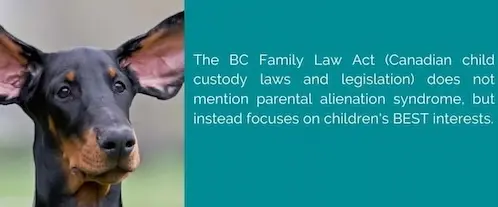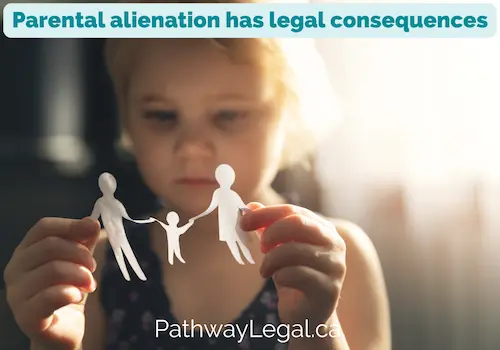Create a better divorce experience join our newsletter for supportive, resolution focused information!
What Are the Laws on Parental Alienation?
- Home
- Parental Alienation
- BC Law and Consequences
You may think that there is a specific parental alienation law that exists as part of the BC Family Law Act. However, the protections for children and affected parents are created by a combination of common law and legislation.
Laws on parental alienation are based upon the assumption that when a parent undermines a child’s relationship with the other parent, it is not in the child’s best interest and is, in fact, a form of abuse. The legal consequences of parental alienation are severe and so they should be.
Here's how the law covering alienation works.
Legislation is created by our legislative bodies. These are the laws that are created by our Premier and Members of the Legislative Assembly (MLA’s). The primary legislation dealing with all parenting matters - not just alienation but a parent - is the BC Family Law Act. However, there is another important component in the mix and that is common law.
How Judges Use Common Law in Parental Alienation Cases

Common law is the body of law that is derived from what judges have said in cases that have come before them. The common law is how judges have interpreted how to apply the BC Family Law Act in separating and divorcing families.
In common law, if a higher court says something about a case with similar facts, the lower courts are bound by what the higher court says when they make their decisions.
So, when understanding the laws on parental alienation in BC, we have to look at both the common law decisions and the BC Family Law Act. An interesting fact is that the BC Family Law Act does not even mention the concept of parental alienation syndrome but focuses on children’s best interests. It is the judge's view on child alienation law that guides us.
It is the judge's view on parental alienation that guides us
What Is Considered Parental Alienation?
The definition of parental alienation is when a parent, either purposefully or unconsciously, has a systematic campaign that undermines a child’s relationship with the other parent. It is a form of child abuse because it can have a lasting effect on the child and on their relationship with the other parent.
The laws on parental alienation are clear that a child is entitled to have a relationship with both of their parents. Sole child custody occurs very rarely.
Need a deeper dive?
- This page explains what is considered parental alienation in extensive detail.
- We also cover the question as to whether parental alienation is abuse in this section of the site. In short, yes it is.
Is Parental Alienation Illegal?

Although parental alienation is not strictly illegal it is an activity that, once before the judge can attract severe penalties. Here's why...
In the BC and Canadian legal context, something is “illegal” or a crime when it goes against legislation that has been created by governing authorities.
For example, we all know that driving while intoxicated is illegal and a crime (it goes against the criminal code), parking in front of a fire hydrant is illegal (goes against our city bylaws), driving without a seatbelt is illegal, and cheating on your income taxes is illegal and if you do it severely enough, can be considered a crime.
In order for something to be “illegal” or a crime it has to violate a law, that is law that has been written in legislation that is readily available to the public.
As a society we say certain behaviours are illegal or a crime for the betterment of our society. Individuals who violate such laws can end up facing certain penalties. In this case, an “offender” may be caught by a law enforcement officer and ultimately charged with the offence and potentially found guilty or penalized by having to pay a fine.
Saying it another way, when something is “illegal” or a crime means that we, as a society, have decided that in order for our society to run properly, people have to follow certain rules and guidelines. We have people hired (like police officers, crown prosecutors, and parking commissionaires) to enforce such laws.
How Is the Law Covering Parental Alienation Different From Normal Laws?
When it comes to the question of parental alienation charges, a police officer, crown counsel, or a parking commissionaire will not have jurisdiction to prosecute such an issue, nor is such an offence set out in any of our legislation.
It is up to the parent fighting parental alienation to bring the issue forward and to protect their kids from parental alienation abuse. When someone has proven parental alienation in court (against the other parent), the focus is not on punishing the other parent, but instead upon preserving the best interests of the child.
When suing for parental alienation, the remedy a parent is looking for is focused on ensuring the child will be okay, not on the fact that the alienating parent was doing something “illegal” and needs to be punished for the betterment of society.
What Are the Legal Consequences of Parental Alienation in BC?
Despite the fact parental alienation in BC is not “illegal” or a crime, the laws on parental alienation, the combination of the BC Family Law Act which focuses on the best interest of the child, and the common law, that is, judges view on parental alienation, is an area with many examples of parental alienation setting out the legal consequences of parental alienation.
Because parental alienation is so serious and so damaging to kids, the legal consequences of parental alienation, and, more importantly, the personal consequences for children and parents are significant.
After successfully proving parental alienation in court, the alienating parent might end up having a much more limited relationship with their child. We have seen cases where the alienating parent’s parenting time has been drastically reduced. In some cases, their parenting time will have to be supervised by a friend or relative, while in other cases, they are required to be supervised by a paid professional supervisor.
In one case, the parental alienation of mother by the father was so severe and repeated despite many warnings by the court, that the parental alienation lawyer succeeded in getting a BC protection order against the father because the parental alienation abuse was so alarming.
The BC Protection Order was clear that if the father tried to contact or see the child, the father would be arrested (and he was arrested on numerous occasions) if he tried to contact the child.
Need a deeper dive?
- We cover the process of proving parental alienation extensively for court on this page. If you are in BC and have questions about your case, please contact us for further assistance.
- The intent and the severity of parental alienation can vary significantly. Our page about examples of parental alienation covers the kinds of behavious extensively. One of our Pathway Legal family law lawyers, will be able to advise the best course of action for you. It may even be possible to resolve the issue without court but, if we DO have to go to court, we will.
- Study the full Family Law Act for BC.
7 Potential Legal Judgements Following Parental Alienation
- Changes to Custody or Parenting Time
Courts may modify custody arrangements to reduce the alienating parent’s influence. The alienated parent may receive increased parenting time or even full custody if the court finds the alienation to be severe. -
Court-Ordered Reunification Therapy
Judges may order family therapy or counselling to repair the relationship between the alienated parent and the child. Parents may need to follow specific court-mandated guidelines to prevent further alienation. -
Contempt of Court
If an alienating parent violates court orders (e.g., refusing to allow visits or making negative statements about the other parent), they may be found in contempt of court. This can result in fines, sanctions, or even jail time in extreme cases. -
Supervised Parenting Time
The alienating parent may have their time with the child restricted to supervised visits with a family friend or a professional to ensure compliance with court orders. -
Parental Rights Termination (in Extreme Cases)
In rare cases where alienation is severe and persistent, courts may terminate parental rights, particularly if it’s determined to be in the child’s best interests. -
Impact on Child Support and Financial Matters
Courts usually separate financial obligations from parenting time, but a parent who loses custody due to alienation may still have to pay child support. -
Criminal Consequences (Rare but Possible)
In extreme cases, if alienation involves false allegations of abuse, criminal charges such as perjury, defamation, or filing a false report may apply.
What you can do
If you suspect that your child is being subjected to such behaviours by the other parent, consult with a parental alienation law firm to discover what your next steps are for protecting your child. Pathway Legal Family Lawyers are very experienced dealing with the laws on parental alienation whether the court becomes involved, or not.


